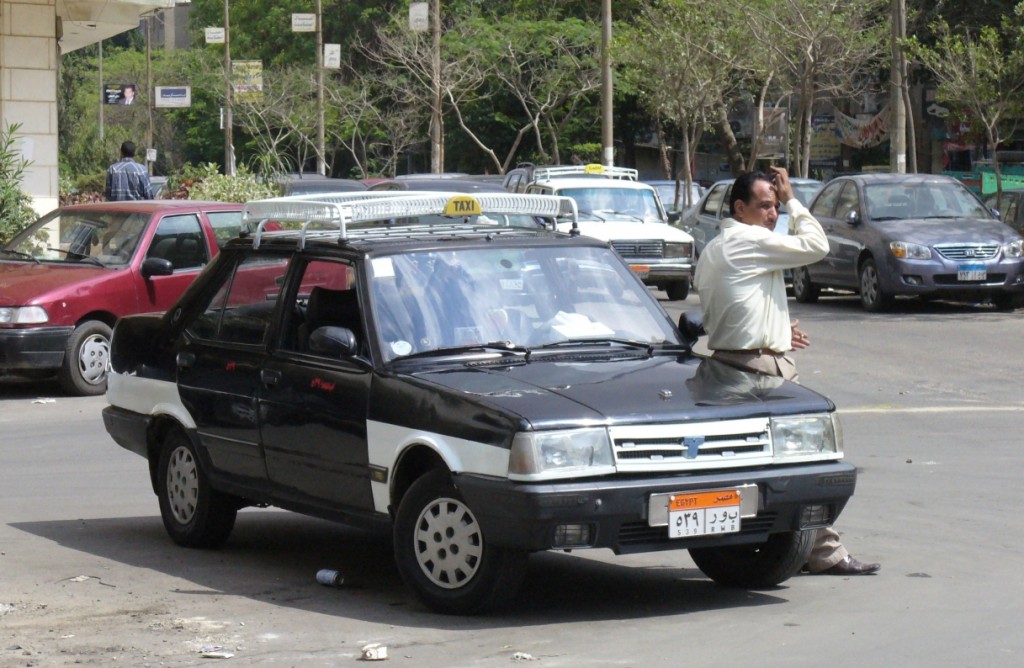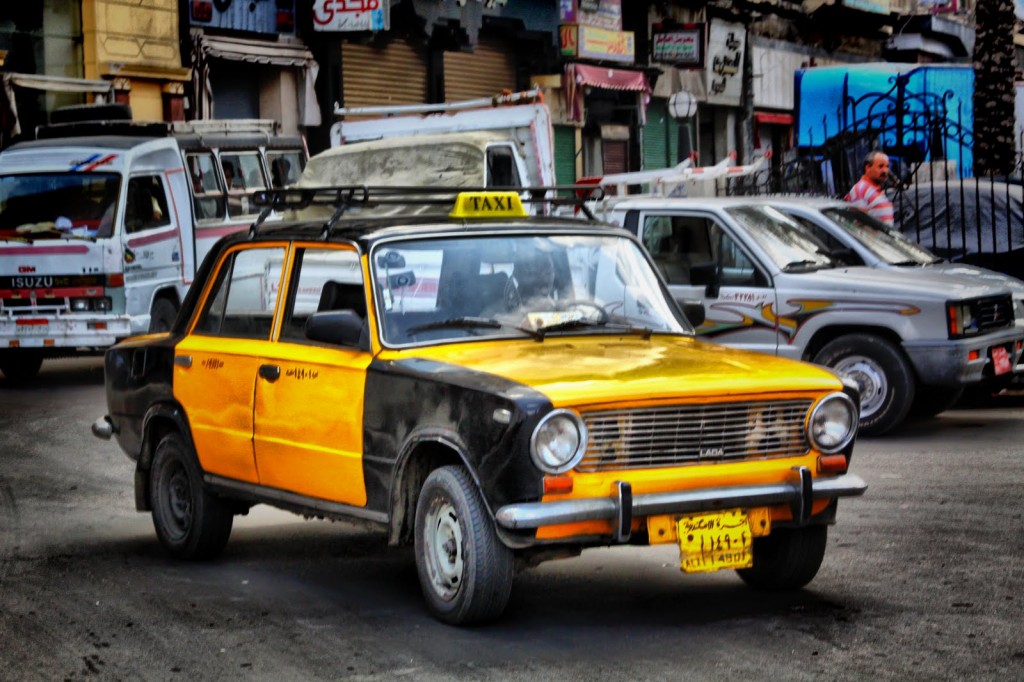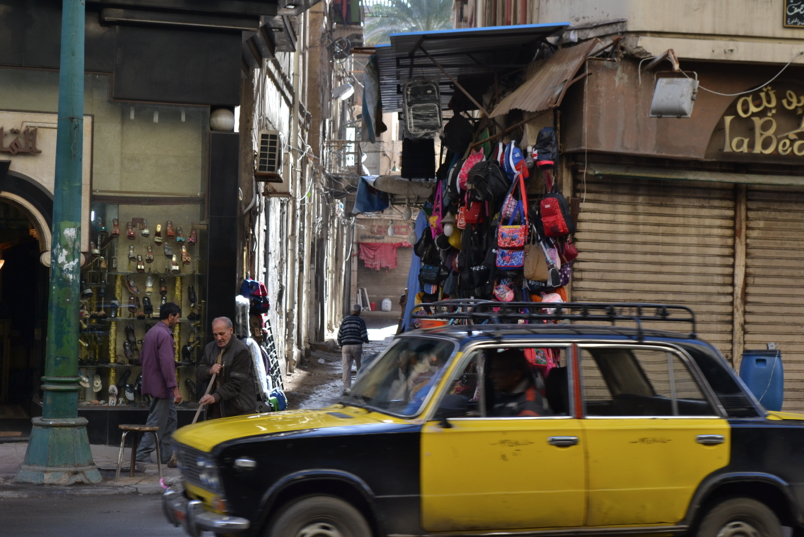By Neil Sutherland*
The best way for a tourist to learn the general thoughts and opinions of a country, is probably from taxi drivers, who are as conversant with a broad section of the population about a diverse number of topics, as barbers or hairdressers, but also come from a wider range of social classes, and are freer to voice their personal opinions.
Taxi drivers in Egypt can be said to have a few idiosyncratic habits.
One (as do restaurants) is to say “Khali” (keep your money). Another (as do government tourist attractions) is to charge locals and foreigners different rates. The tradition is for the seller/host to refuse your money three times, and the buyer/guest to insist on paying three times. Problems arise when foreigners take the offer of “keep your money” seriously, and walk away without paying. Really, the shop-owner usually acts like they don’t know what to say. How can they tell the tourist that it’s a tradition, and that they ‘didn’t mean’ what they said?
In one case, the local taxi fare was increasing at an exponential rate, from a long tradition of two Egyptian pounds for any ride within that city, to three pounds, but with some unscrupulous drivers asking for even more, or at least not giving back change if you gave them a five-pound bill. During this period, I took a ride to work in a taxi one day, and the(older) driver was pleasant enough. When I got out he said “Khali’ Khali”, but when I handed him three pounds, he said “no, five pounds (khamsa)”!
An annoying habit of Egyptian drivers in general, and not just taxi drivers, is to incessantly honk their horns. It can mean, like it does in other places, “you can’t see me… here I am”, but here it too often means “get out of my way, I stop for no one”. In any case, it is done so often, that it has become an incurable habit, like smoking.
One time, I needed to go to a place outside the city. I can’t recall if we were in the desert or in farmland, in any case, there was no other car in sight, yet the (older) driver continued to honk his horn. I couldn’t help laughing, and when he realized what I was laughing at, he tried to stop. He did stop, but like an addict of smoking , drinking, etc. going through withdrawal symptoms, his right hand kept shaking, as his left hand tried to hold it from the horn.
I suppose taxi drivers and truck drivers everywhere try to get to their destinations as quickly as possible. However, in Egypt, with its chaotic traffic, and little fear of getting a traffic ticket, taking a taxi or microbus can be an adventure ,but without the guaranteed safety of a roller-coaster ride. On one microbus ride, the driver (always young) was weaving in-and-out of traffic at break-neck speed, when a passenger asked him to be careful or slowdown, to which he responded by laughing like a madman.
Once, when fare was still two pounds (enough to buy a pencil), I was witness to a car accident, what we call a fender-bender. Apparently the taxi had been going at high speed with no (as usual) margin of error, and hit the car in front of him when it slowed down. The two drivers got out of their cars and inspected the damage (I couldn’t see any) . After they both had taken a look, the other driver pointed towards the fenders, and said to the taxi driver: “you did this, to make two pounds?!”
The Egyptians have a joke about this driving habit. There’s a tourist taking a ride in a taxi, when the Egyptian driver goes through a red light. The tourist says “you just went through a red light”!, to which the driver laughs in response. At the next intersection the driver again goes through the red light. The tourist says: “you just went through another red light!”. The driver responds “relax, I’m a professional”. But at the next intersection, the driver stops at a green light!. The tourist asks: “You went through two red lights, so why are you stopping now?” He answers: “For the other professional Egyptian taxi drivers”.
My Arabic was very limited when I first encountered this next taxi driver custom. Most Egyptian men have the habit of smoking, so when the taxi driver leaned over, gesturing with a cigarette in his hand, I thought he was saying “Do you mind if I smoke?”. I gave the right answer “No”, but in the wrong context. The driver was saying: “welcome to Egypt…., have a cigarette”(I don’t smoke).
Language never stops being a problem. I have a large vocabulary of Egyptian Arabic now, but most people still have trouble with my pronunciation of most words.

When I lived in an area called Della, taxi drivers often had trouble with my directions. One time, he asked “where to”? and I answered “dela”, he said “dewa?” I said no, “delllla”, to which he said “ab-della?”. At that point, I usually avoid high blood pressure by giving simple directions of straight (allatool), left (shemal) or right (yemeen).
These language mistakes are usually not too costly, the biggest exception being the first time I had to take a microbus from an area (named Ramses, event though the giant statue of Ramses II has been removed from that spot a long time ago)that is on the subway line, to a suburb that wasn’t. I tried to ask for Nasr City by saying “nasr”, then ‘nasrrrr’, then ‘nauser’, then’ medina (city) nasr’, etc.. Nothing was working, until a man came along and said yes, and took me by the hand, and put me on a microbus. We had been traveling for about 40 minutes, when I noticed we were in farmland. I was certain there was no farmland between Ramses and Nasr, so I asked the driver, where are we going? And he answered “Tanta”, which is a city in the delta of the Nile river. I still don’t know how anyone could mistake my pronunciation of ‘nasr’ ,with ‘tanta’. If getting lost had resulted in a lost day, was the bad news, the good news was they let me go back to Cairo for free, a generous, if small, consolation.
Sometimes I have to resort to adding body language. It is supposed to be 70% of language, and sometimes it worked, other times it didn’t. When I was going to work and used Kalbz restaurant as a landmark, I would say ‘kalbz’, and the driver didn’t understand , I would say ‘kalbzzzz’, kaulbz’, etc., then matam (restaurant) kalbz, mtaum kalbz, and when that didn’t work, I would begin to pretend to eat, placing my hand to my mouth, ‘mmm’ yum yum ‘..matam’. Then the driver would say: “oh, matam kalbz”.. and I would grown and say ‘yes, matam kalbz’.
Another was the area built around the great pharaoh ‘s obelisk (in Arabic ‘masala’). I would say “masala”, and the driver wouldn’t understand, so I would try to imitate the shape of the masala with my fingers. Sometimes they would understand, but others would say “finger”?
This kind of willful ignorance is mostly attributable to a lack of confidence in their English, so they don’t know if the tourist is speaking English, or speaking Arabic with a bad accent. The most annoying case was asking to go to the only tourist attraction in town, the Greco-Roman waterwheels (‘sawaqi’) that make up the city center. I would say “sawauy’, and some driver would say ..I can’t remember what their ridiculous utterance was (“timbuktu”?), but I’m a tourist (for all they know), so what else could I possibly be saying, other than the only tourist attraction?
Sometimes even pictures and body language are to no avail. In this case, I was trying to find a laundrette. Actually, I have never seen a laundrette in Egypt, only dry-cleaners. I should have asked the man/men for dry-cleaner (tandeeef-nashif), but I didn’t know that, and asked for washer (ghasala). Anyways, when he/they didn’t understand ‘ghasala’ no matter how I pronounced it, I pointed at my shirt, in response to which he repeated (‘shemeees”), “no no” I said, and pointed to my pants, in response to which he said ‘bantalon’?. Then I made a stirring motion with my hands and arms, as though I were washing clothes by hand, to which he/they responded, …I can’t remember what their ridiculous ‘guess’ was, but I would never have them on my team in a game of charades.
As time went on, I spoke enough Egyptian Arabic to do all the phrases used in greetings, and even knew that when I said I came from Canada, and they responded ‘hassan nass’, it meant ‘good people’. At that point in the conversation, the taxi driver would say ‘you speak good arabic’ (tit-kalam arabeekteer quice). Assuming that I could understand them, they would proceed to speak Arabic for the remainder of the trip, with me just nodding or saying ‘yes’ in assent, while being lucky to even grasp the gist of what they were talking about.
Once-in-a-while, I’ll come across a driver whose speaks good English. This is either because of their education or work experience. Egyptian taxi drivers basically come from three backgrounds: they’re either very poor and uneducated; worked in the Gulf countries or Egypt’s Red Sea tourist resorts and came back with some proficiency in English (and Russian and Italian) and enough money to buy a car, or they’re educated but couldn’t find work in their chosen profession or use the taxi money to supplement their meager income. One of the most common to work outside their profession are law-school graduates. Actually, law is not the most prestigious school for Egyptian high school graduates to be accepted into; that would be medicine and engineering. However, it’s still respectable, and has a fairly large student body. But unlike something like teaching, there just are not many jobs for lawyers. With Egypt’s population explosion and tuition-free university, even the education faculty produces far too many graduates for the number of job opportunities available. This over-supply – and Egypt’s broke government – also makes the demand-end bad for people who do get a teaching job, with schools paying unlivable wages. So teaching graduates are probably the largest group working as taxi drivers to supplement their income (something they also do with private lessons).
Religion is also more omnipresent in taxis than anywhere else. Quite a few Muslims will play tapes of reciting of verses in the Holy Koran. Both Muslim and Christian will often ask what my religion is. If I say I am Christian to a Christian taxi diver, he will usually show me a picture of a local Coptic (Egypt’s indigenous denomination of Christians, who, while only a fractional minority in Egypt, surpass a dozen European countries in population) saint or patriarch.

There have been a couple of occasions when the issue of “haram’ (forbidden’) has come up, both taking place in Nasr city. The first time, there were a couple of young guys selling colored afro wigs, to drivers stuck in traffic. My driver rolled down his window, and called out to them “haram”! The wigs were certainly ridiculous, and I don’t know anyone who would want to buy one, but I am pretty sure they’re not ‘forbidden’. Once warmed up, in the proceeding three blocks, he stopped more than once to call out of his window “haram”, at public displays of affection.
The other time, the driver was a salafist, who grow their long beard from the chin down, and make little or no attempt to groom it. When he picked me up with my groceries outside Metro supermarket, he wondered if I had bought any pig meat (ham, bacon), which is of course the forbidden meat for Jews. I said “No” (‘la’), but he wouldn’t stop asking, and even took the liberty of looking at the contents of my bags. I wouldn’t say he was in a fit of rage, but I’m pretty sure that he would have been, if he’d found one strip of bacon, as if it were a piece of radioactive waste. I’ll call this the closest ‘call’ that I’ve had with a religious fanatic.
*This is an excerpt from a book by Neil Sutherland. There are five parts to the book, which is about the people Egypt (their idioms, traditions and social classes) from a perspective different and more complex than portrayed by Western news services and travel guides. Neil is a PhD social scientist participant-observer.






Comments (43)
The white metered taxis of Cairo are now the better choice. No haggling for the price and no surprises. With all the college grads driving them it’s no problem as most speak English or enough. Alexandria you still have to agree on the price before you ride. Many drivers are picky as to where they’ll go. In Alex if you live near the tram system you can go all across from Rahml to Victoria Sq. for half a LE. The microbuses are a challange but people tend to be friendly and helpful.
I’ve been on many taxi rides in Cairo. It’s fair to that each one has been an adventure.